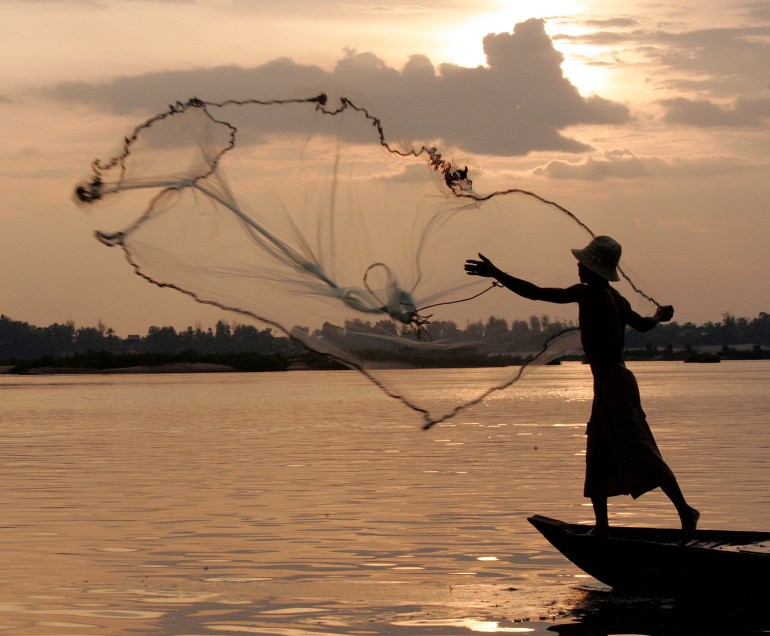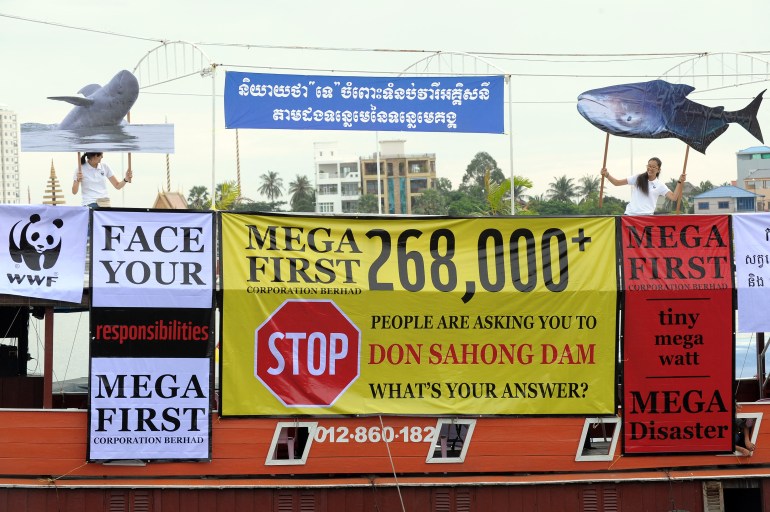The fishing gangs visit the river by night and the rangers do nothing to stop them.
Working in large groups, the boatmen use fishing methods that have long been outlawed in this part of the Mekong – one of Asia’s mightiest rivers – like gillnetting, which uses nets that hang like a curtain in the water and snag fish by their gills, and electrofishing.
Normally, the rangers would intervene. But these days they hang back out of a mix of intimidation and sympathy for neighbours made desperate by the pandemic.
Cambodia’s strict fishing rules, first imposed in 2006, are crucial to the fortunes of the Mekong dolphin, giving the rare but nationally beloved animal a chance at survival after decades of population decline.
But while dolphin conservation is broadly popular in Cambodia’s poor river communities – and some make money from the visitors they bring – the economic stresses of the pandemic when borders were closed for months forced some into desperate measures to feed their families.
“We are trying to protect dolphins but criminals are also catching them,” said 63-year-old Sun Koeung, who can earn up to $15 a day from taking people out onto the water to watch the dolphins.
He says the illegal fishing crews take to the river at 11pm, an hour after the River Guards have completed their shift.
“If we lose dolphins, no income at all,” he added.
The illegal activity, hidden in plain sight, helps explain why Mekong dolphin populations are struggling despite nearly two decades of work to support them.
The Mekong dolphin is a subgroup of the Irrawaddy dolphin, a species found throughout Asia. Its distinctive mouth gives it the appearance of smiling and its intelligence and playfulness have charmed humans for generations. River communities in Laos and Cambodia revere the dolphins as reincarnated ancestors.
Thousands of these dolphins once lived in the waters of the Mekong, which flows from China down through Myanmar, Thailand, Laos, Cambodia and Vietnam. Today an estimated 89 dolphins in Cambodia are all that remain.
High death rates, especially among baby dolphins, have conservationists fearing for their future. There is little margin for error as the dolphins only reproduce every two to three years.
“Back in 2009, we thought we were actually going to make a difference,” said Randall Reeves, a scientist affiliated with the International Union for the Conservation of Nature (IUCN) and an adviser to the Cambodia programme. “I don’t feel we really have.”
The dolphin’s story is just one of millions that make up the global biodiversity crisis as governments sit down this week to thrash out new biodiversity targets at the long-delayed COP15 in Montreal. Without action a million plant and animal species face extinction within decades, scientists warn.
However, the recovery of some iconic species, such as bald eagles in the United States, pandas in China and tigers in South Asia show that targeted, politically supported plans can deliver results.
It was in that spirit that Cambodia and Laos teamed up with the IUCN and the Worldwide Fund for Nature (WWF) to save the Mekong dolphin more than 10 years ago.
Early conservation efforts
In Cambodia, the dolphins had a powerful champion in Touch Seang Tana, a career fisheries expert who called them symbols of “national heritage” and made their protection a personal cause.
Once a rock star in a popular Cambodian band, the colourful Tana rose through the bureaucratic ranks to join the Council of Ministers, the cabinet of Prime Minister Hun Sen.
In 2006, he assumed a prestigious role, head of Cambodia’s Dolphin Commission, with responsibility for overseeing the recovery plan.
Tana framed dolphin conservation as a fishing problem and he favoured a stern hand to control it.
That year, Cambodia banned gill nets in the dolphins’ preferred areas. To enforce the ban, it established the River Guards, a team to patrol the water and confiscate illegal fishing gear. With the help of overseas funding, the team expanded to 72 rangers equipped with motorboats, smartphones, night-vision goggles and a drone.
By 2017, the measures appeared to be working: The dolphin population had risen from 80 to 92.
But there were problems, too.
Some river communities had come to resent the enforcement of the strict rules on fishing in the absence of any attempt to develop alternative livelihoods, said Isabel Beasley, a scientist who began fieldwork on the Mekong dolphin in 1997.
To feed their families, some bribed the River Guards to look the other way, she said.
Some even buried the dead dolphins they found, for fear of punishment, according to two former WWF officials.
According to a joint report by the project partners, the programme failed to record a number of deaths in 2009, 2012 and 2014.
But in Cambodia’s hierarchical political culture, to point out these issues would have been seen as undermining Tana who insisted the main issue was the gill nets, even as poverty – the root cause of illegal fishing – persisted.

In an interview with Al Jazeera, Tana said people living in river villages were given tractors and water pumps so they could supplement their incomes with farming.
“I gave satellite TVs to every village, two to three of them so they can get together to watch media. They were happy,” he said. “You can’t just use regulations and law. You have to strongly do social negotiation, that’s the most important.”
He accuses foreign NGOs of sometimes exaggerating dolphin deaths and estimated that in 2014, the year he retired, the population was 220.
He denies dolphin deaths were missed, pointing to strong monitoring by WWF and researchers.
“NGOs are good. Like WWF,” Tana said. “But the people who work for NGOs are human,” he said. “Some people want to be a big man. ‘I’m the big global NGO or organisation. I have to control everything, you have to follow me.’ No. This I can’t accept.”
Development is king
At the Laos-Cambodia border, where the Mekong broadens into a sweeping river pool, the dolphins’ situation was even direr.
By 2012, this “transboundary” population had fallen to six, a group so small it could only survive through intense protection.
Lao officials supported dolphins in principle. Lao’s own endangered species list gave Mekong dolphins the highest level of protection under the law.
But in practice, Lao officials “seemed hesitant to make a commitment” to match Cambodia’s tough fishing controls, said Somany Phay, an official with the Cambodia Fisheries Administration who tried to coordinate strategy with Laos.
“People in Laos considered it a sensitive issue,” he said.
The dolphin habitat overlapped with a resource of national interest: energy.
In 201, Laos approved the Don Sahong dam, a project to send energy to Cambodia. Laos has built dozens of dams as part of a national strategy to export electricity.
WWF begged Laos to reconsider, saying dam construction would batter the dolphins’ sensitive hearing structures, “almost certainly” killing the last six.
Regardless, the dam became operational in 2020.
Last February, WWF-Laos confirmed the death of the last survivor, which some called “Lone George”.
For some, it was a harsh reminder that while conservation was important, ultimately development was king.
“They’re proud of the dolphins,” sighed one official involved on the Lao side. “But they won’t put resources into it.” The source declined to be named for fear of repercussions in the closely-controlled country.

The mystery of the dead dolphins
While Cambodia’s policies have kept adult dolphins alive, high infant deaths continue to baffle scientists.
In 2020, eight calves were born but four died, according to a report.
The dolphins’ typical lifespan is 27-30 years. Of the current population, 70 percent are over 20, according to WWF.
Over the years, newborn corpses have been found with signs scientists deem ambiguous or even mysterious: skull fractures, blue lesions around the throat and sometimes no visible signs of harm.
Tooth and tissue samples were sent to labs in the US, dozens of bodies were necropsied and genetics and bacterial cultures were analysed, among the many efforts to solve this mystery.
None has delivered a clear answer, said Frances Gulland, chair of the US Marine Mammal Commission and a longtime adviser to the Cambodia programme.
Gulland pointed to small sample sizes – just two to seven specimens a year – and inadequate local infrastructure to receive fresh, undisturbed bodies and analyse them. “These animals are sometimes liquid” by the time they reach the lab, she said.
Next month she and a small team of scientists will visit Cambodia to shore up lagging aspects of the programme and begin work on a new population estimate.
But critics say the dolphin project is emblematic of the IUCN’s weaknesses.
IUCN scientists are unpaid volunteers and they can generally only commit small amounts of time to field visits.
“What are their achievements? Just workshops,” said Verné Dove, a field veterinarian who participated in the programme from 2006 to 2011 and has just published a dissertation attributing infant deaths to disease.
“There just comes a time when you have to do something.”












